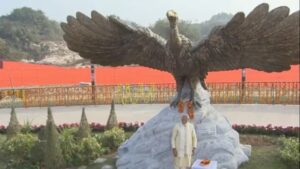
New Delhi: Ayodhya, a town located in the state of Uttar Pradesh along the banks of the Saryu River, is preparing for the commencement of the seven-day consecration ceremony of the Ram temple, known as the ‘Pran Pratishtha’. The highly anticipated rituals will begin on Tuesday and culminate with a grand ceremony on January 22. This auspicious event will be graced by the presence of Prime Minister Narendra Modi, who will preside over the proceedings, joined by thousands of esteemed guests.
The construction of the Ram temple began after the Supreme Court settled a longstanding dispute over the site back in November 2019, which paved the way for the construction to commence. The vision for this temple can be traced back thirty-three years when Lal Krishna Advani, a notable figure in the Bharatiya Janata Party, embarked on a significant journey known as the rath yatra, traveling from Somnath in Gujarat with the purpose of building a temple dedicated to Lord Ram, the seventh avatar of Lord Vishnu. Accompanying Advani during this endeavor was Narendra Modi, who is now serving as the Prime Minister of India.
In an article entitled ‘Ram Mandir Nirman, Ek Divya Swapna Ki Purti’, set to be published in a special edition of Rashtradharma, a renowned Hindi literature magazine with a 76-year-old legacy, Advani expressed his belief that when Narendra Modi performs the consecration of Lord Ram’s idol at the temple, he will symbolically represent the entire Indian citizenry. Advani also expressed his prayer that the construction of this temple will serve as an inspiration for all Indians to embrace the virtuous qualities embodied by Lord Ram.
It is noteworthy that Prime Minister Modi played a pivotal role in the organization of the rath yatra back in 1990 when he served as the general secretary of the Gujarat BJP. Thirty years later, in 2020, he participated in the ‘bhoomi pujan’ ceremony, which marked the laying of the temple’s foundation. In preparation for the upcoming ‘Pran Pratishtha’ ceremony, Prime Minister Modi announced last Friday his intention to undertake an eleven-day ‘anushthan’, a special ritual associated with this sacred occasion.
Over the course of the next seven days, the consecration ceremonies will incorporate elaborate rituals steeped in the traditions of Hinduism, leading up to the main ceremony. On January 16, the designated host appointed by the Shri Ram Janmbhoomi Teerth Kshetra will oversee the atonement ceremony. As mentioned earlier, the ‘Dashvidh’ bath, a ceremonial cleansing, will take place on the banks of the Saryu River, accompanied by the observance of Prayaschita and Karmakuti Poojan rituals.
On January 17, the auspicious occasion of Parisar Pravesh will be celebrated as the Ram Lalla idol is brought into its designated place within the temple. The following day, January 18, will witness the performance of rituals such as Teerth Poojan (offering sacred water), Jal Yatra (procession with holy water), and Gandhadhivas (waving of fragrant incense).
The morning of January 19 will witness the rituals of Aushadhadhivas (offering of herbs), Kesaradhivas (smearing with saffron), and Ghritadhivas (anointing with ghee). In the evening, the Dhanyadhivas ritual, which involves the offering of grains, will take place.
On January 20, the morning will see the observance of the Sharkaradhivas (offering of sugar) and Phaladhivas (offering of fruits) rituals. In the evening, the Pushpadhivas (offering of flowers) will be conducted.
Finally, on January 21, the Madhyadhivas ritual will occur in the morning, followed by the Shaiyadhivas ritual, which involves placing Lord Ram in a reclining position, in the evening.
These seven days of consecration rituals within the Ram temple symbolize a momentous occasion for Ayodhya, bringing together reverence, faith, and cultural significance. The consecration ceremony serves as a testament to the devotion and aspirations of millions of people, and it marks a significant milestone in the history and spiritual heritage of India.











